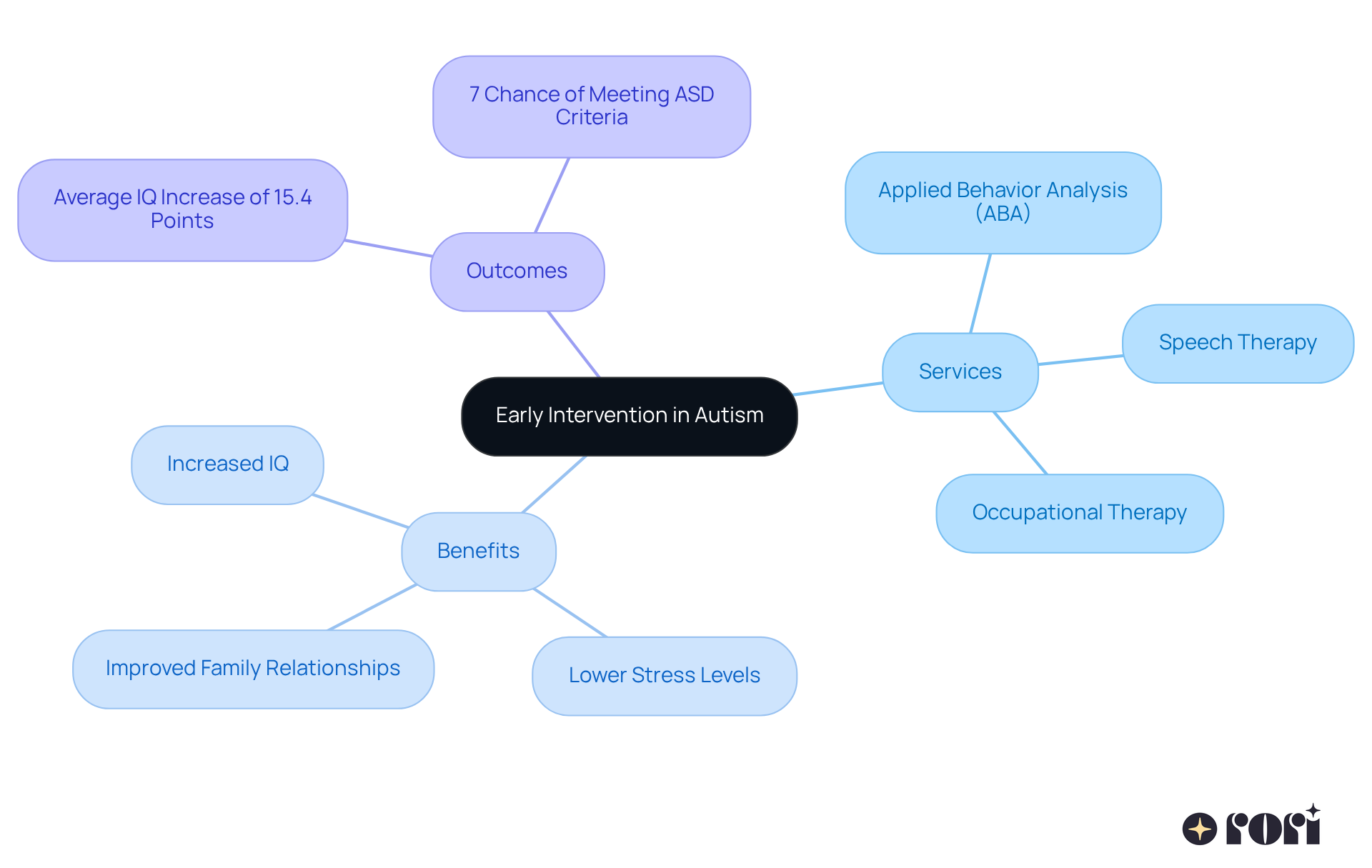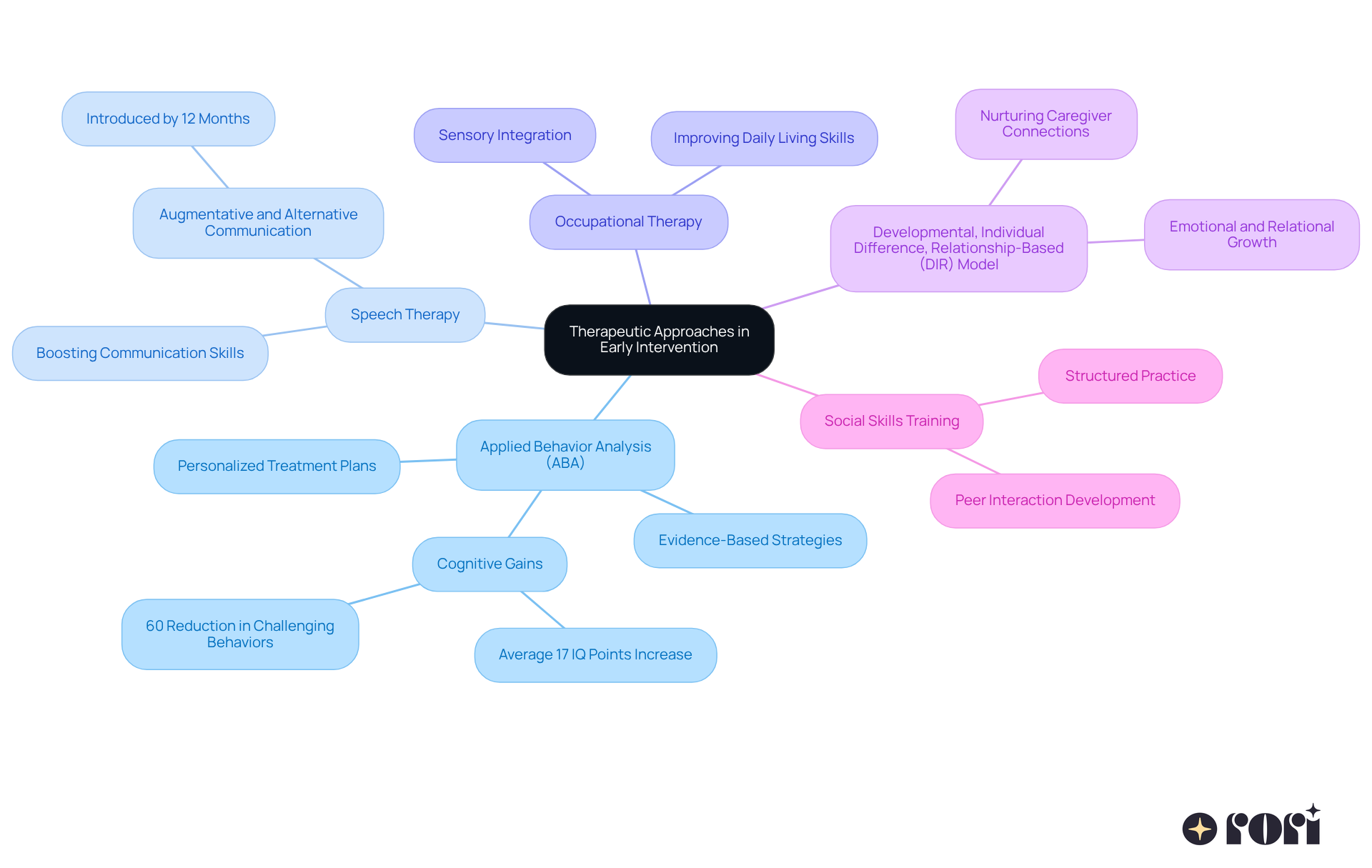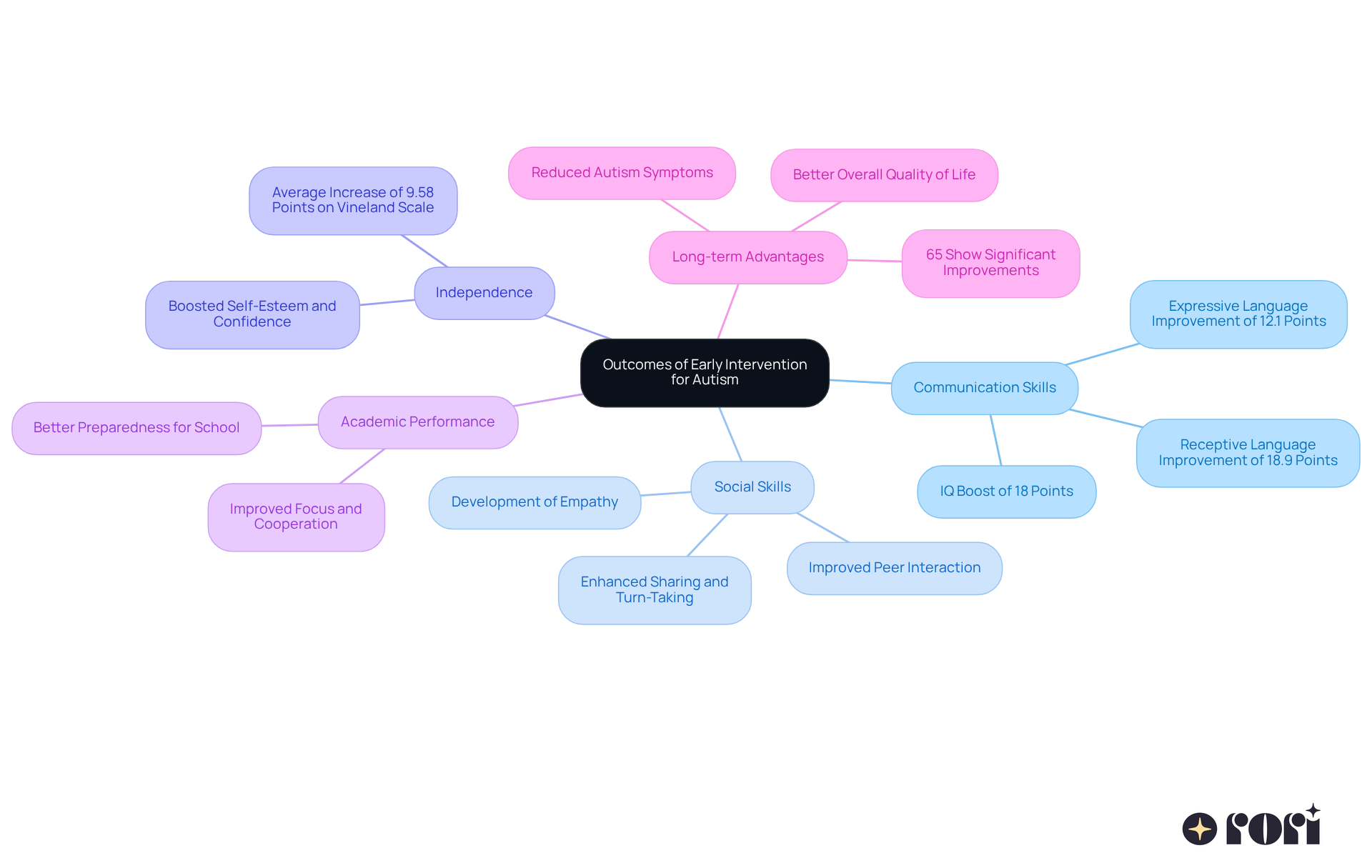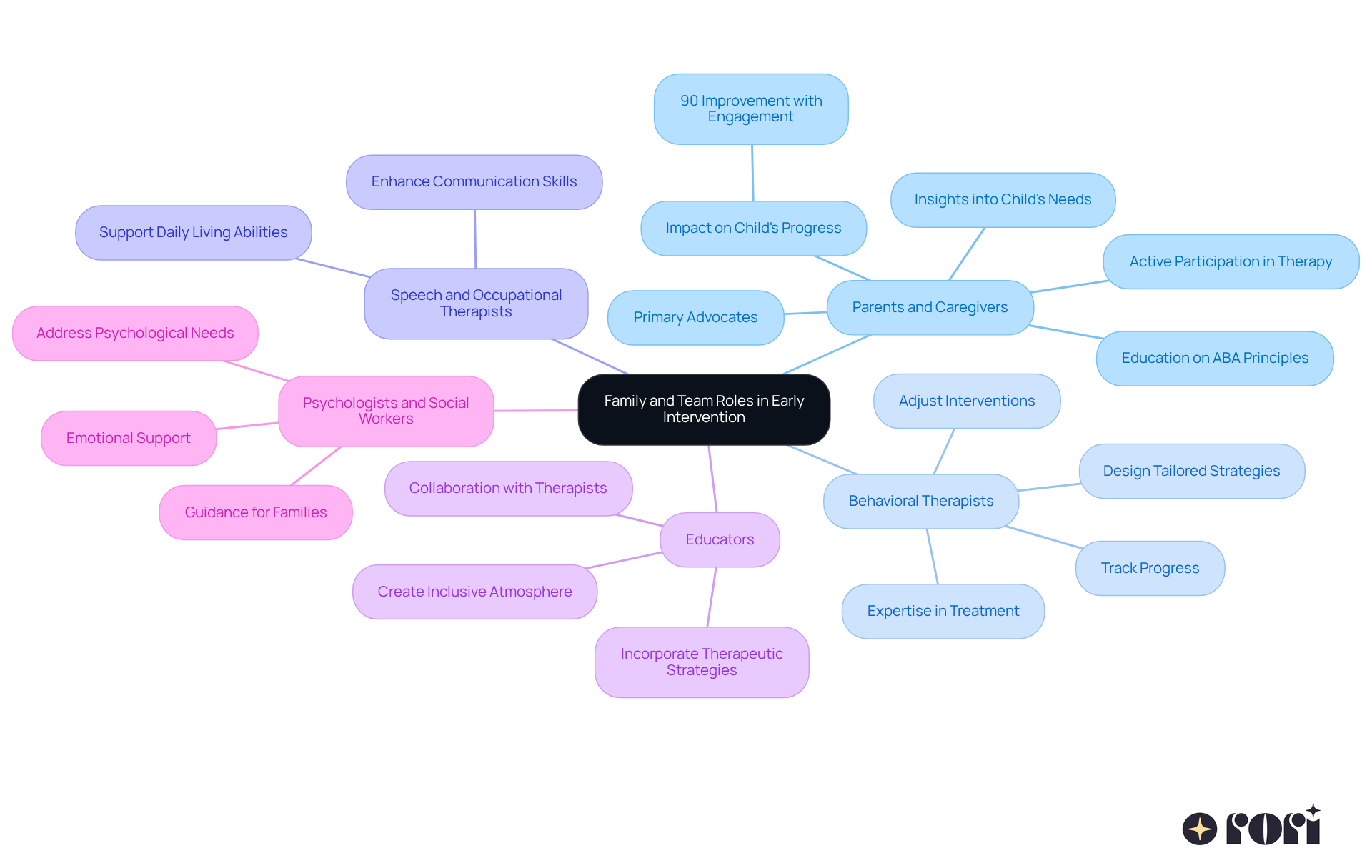Early intervention for children with autism can truly make a world of difference! 🌟 It significantly boosts developmental outcomes, like communication, social skills, and independence. Research shows that kids who get early support—think Applied Behavior Analysis (ABA) therapy—tend to experience greater cognitive gains and enjoy a better overall quality of life. This really highlights how crucial it is to have timely and tailored interventions.
As a parent, you might be wondering how to navigate this journey. It can feel overwhelming at times, but you’re not alone! Many families have found that reaching out for help early on has led to amazing improvements. Just imagine your child thriving in social situations or expressing themselves more clearly. It’s possible, and it starts with taking that first step.
So, let’s explore this together! If you’re considering early intervention, know that there are resources and support systems ready to help you every step of the way. Your child deserves the best, and with the right support, they can truly shine!
Timely support for children with autism spectrum disorder can truly shape their developmental journey. Early intervention includes a variety of services aimed at boosting communication, social skills, and addressing behavioral challenges. This proactive approach often leads to better outcomes for these young individuals.
Yet, many families might not realize just how impactful early intervention can be. What specific benefits can these early therapeutic methods bring? And how can families make sure they’re tapping into their child’s full potential?
Let’s explore this together! By understanding the importance of early support, we can help pave the way for brighter futures. After all, every child deserves the best start possible!
Timely support in autism encompasses a variety of services aimed at helping individuals with autism spectrum disorder (ASD) and other developmental delays, typically starting from birth to age three. This proactive approach is all about boosting a young person's development by tackling challenges in communication, social skills, and behavior. Initial support programs often include therapies like Applied Behavior Analysis (ABA), speech therapy, and occupational therapy, all tailored to meet the unique needs of each child.
At Rori Care, we’re dedicated to empowering young individuals with the skills they need to navigate the world independently through our comprehensive ABA therapy. Our individualized planning ensures that every behavioral plan is tailor-made to fit the unique needs, strengths, challenges, and goals of the client. This personalized care is crucial during these formative years! We set clear, measurable goals for behavior change and skill development, providing a transparent benchmark for progress.
Research shows just how impactful early intervention can be on autism early intervention outcomes. For instance, kids who start intensive early therapy before the age of three often show significant advancements in IQ, language skills, and social interactions, positively impacting autism early intervention outcomes by taking advantage of the brain's high neuroplasticity during this critical period. Did you know that children in programs like the Early Start Denver Model (ESDM) can experience an average IQ increase of 15.4 points? That’s compared to just 4.4 points for those who start later! Plus, infants receiving proactive support have only a 7% chance of meeting ASD diagnostic criteria at age three, versus 21% for those receiving standard care.
The benefits of prompt assistance for autism early intervention outcomes extend beyond personal growth; they also nurture healthier family relationships and enhance overall quality of life. Families involved in early intervention often report lower stress levels and improved relationships, as they gain tools and strategies to support their child’s development. Our caregiver education program further enhances support by equipping caregivers with a deeper understanding of ABA principles and strategies, enabling informed decision-making that positively impacts their child's progress.
The Modified Checklist for Autism in Toddlers (M-CHAT-R/F) serves as a handy screening tool, backed by parental observations, to catch developmental red flags early on. Plus, timely support encourages inclusion in standard educational settings, helping to reduce stigma and promote peer interactions.
Experts emphasize the importance of timely support, noting that caregivers are often the first to spot developmental warning signs. By actively engaging in their child’s support, parents can reinforce skills learned in therapy, creating a nurturing environment that fosters growth. As one expert wisely put it, "By tackling these issues promptly, young individuals can develop more adaptive methods of reacting to their surroundings, thereby improving their overall functioning and quality of life."
In conclusion, prompt support isn’t just beneficial; it’s essential for maximizing a young person's potential and ensuring that they receive the comprehensive care necessary for positive autism early intervention outcomes. Let’s explore this journey together!

When discussing autism early intervention outcomes, several therapeutic approaches play a vital role, each tailored to meet specific developmental needs. Let’s dive into these methods together!
Applied Behavior Analysis (ABA): This evidence-based approach uses reinforcement strategies to encourage positive behaviors while reducing challenging ones. Research shows that kids who start ABA therapy before age three can see impressive cognitive gains—on average, about 17 IQ points more than those who begin later. Plus, intensive ABA therapy can lead to a 60% drop in challenging behaviors within just six months! At Rori Care, we personalize our ABA therapy, crafting each behavioral plan to fit the unique needs, strengths, and goals of the individual. We set clear, measurable objectives for behavior change and skill development, giving you a transparent way to track progress. Our behavior analysts use the latest research-backed strategies, ensuring we apply the most effective methods for change. And we don’t stop there; ongoing assessments and adjustments to the treatment plan are key to enhancing results based on how the individual is doing.
Speech Therapy: This approach focuses on boosting communication skills, helping young ones express their needs and feelings more effectively. Early intervention is crucial for achieving positive autism early intervention outcomes! Kids with communication challenges benefit the most when they’re introduced to augmentative and alternative communication strategies as early as 12 months.
Occupational Therapy: Aimed at improving daily living skills and sensory integration, occupational therapy helps kids gain more independence. It tackles various challenges, from motor skills to sensory processing, which are essential for handling everyday tasks.
Developmental, Individual Difference, Relationship-Based (DIR) Model: This model highlights emotional and relational growth, nurturing connections between children and their caregivers. It’s all about understanding each child’s unique emotional needs and developmental differences.
Social Skills Training: This structured approach gives kids a chance to practice social interactions in a supportive environment, helping them engage with peers and develop essential social skills.
Each of these therapeutic methods can be customized to meet the specific needs of your child, ensuring a comprehensive and effective strategy that enhances autism early intervention outcomes and sets the stage for long-term success. Let’s explore this journey together! We’re here to help you every step of the way!

Studies consistently show that early support can lead to significant improvements in various developmental areas, enhancing autism early intervention outcomes for individuals with autism. Let’s take a closer look at some key outcomes:
Enhanced Communication Skills: Many children show remarkable progress in their ability to communicate effectively, both verbally and non-verbally. For example, kids involved in the Early Start Denver Model (ESDM) program have seen an average IQ boost of 18 points! This really highlights how effective targeted communication strategies can be.
Enhanced Social Skills: Early support helps kids develop essential social skills like sharing, taking turns, and picking up on social cues. Those who receive help before turning three are more likely to build strong communication and social skills, which are so important for forming relationships.
Increased Independence: Kids often gain more independence in their daily activities, which can boost their self-esteem and confidence. Research shows that Early Intensive Behavioral Intervention (EIBI) significantly enhances adaptive behaviors, with an average increase of 9.58 points on the Vineland Adaptive Behavior Scale.
Enhanced Academic Performance: Early support lays the groundwork for better performance in school. Children become more prepared to interact with peers and teachers, and improved social skills—like staying focused on tasks and cooperating—are closely linked to academic success.
Long-term Advantages: Studies suggest that kids who get timely assistance may experience lasting positive effects, including reduced autism symptoms and a better overall quality of life. About 65% of children identified and treated before 2.5 years show significant improvements in autism symptoms within one to two years. However, it’s concerning that only 15% of preschoolers with ASD receive early intervention services before age two. This really underscores the need for greater awareness and access to these vital services.
At Rori Care, our clinical leadership team is all about neurodiversity and empowering caregivers with ABA principles and strategies. By actively involving caregivers in the therapeutic process, we help them support their children’s development, leading to better behavioral outcomes and improved family dynamics. This approach aligns with the benefits of caregiver education, which includes increased support, informed decision-making, and better behavioral results. Experts from organizations like the CDC emphasize the importance of early assistance in improving autism early intervention outcomes for individuals with autism spectrum disorder, reminding us that timely support can truly shape a person’s developmental journey.
Let’s explore this together! We’re here to help you every step of the way!

In early intervention, the partnership between family members and professionals is so important for helping a young person grow. Each participant has a unique yet connected role:
Parents and Caregivers: As the primary advocates, they provide invaluable insights into their child's needs and progress. When they actively participate in therapy sessions, it not only reinforces learning but also ensures that strategies are consistently applied at home. Research shows that when parents are involved, kids often make remarkable strides—90% see significant improvements when they fully engage in the recommended hours of Applied Behavior Analysis (ABA) therapy. At Rori Care, our compassionate clinicians are here to guide families through this journey, emphasizing the comprehensive nature of our ABA treatment and the importance of caregiver education. This education empowers caregivers with ABA principles and strategies, enhancing their ability to support their child's behavioral goals. As Temple Grandin wisely said, 'I am different, not less,' reminding us of the unique strengths that parents can help nurture in their children.
Behavioral Therapists: These professionals design and implement tailored therapeutic strategies, continuously tracking progress and adjusting interventions as needed. Their expertise is crucial in developing effective treatment strategies that align with each individual's unique requirements. At Rori Care, our clinical leadership team, including skilled Registered Behavior Technicians like Monica Ewing and Autism Case Managers such as Valentina Zea, is dedicated to neurodiversity and the success of youth, offering free consultations to families.
Speech and Occupational Therapists: Focusing on specific skill enhancement, these therapists provide specialized support to improve communication skills and daily living abilities, which are essential for a young person's independence.
Educators: Teachers play a vital role in incorporating therapeutic strategies within the classroom, creating an inclusive atmosphere that supports students' learning and social interactions. Their collaboration with therapists ensures that strategies are consistently applied across different settings.
Psychologists and Social Workers: Offering emotional support and guidance, these professionals help families navigate the complexities of autism. Their involvement is key in addressing the emotional and psychological needs of both the child and the family. As Dena Gassner pointed out, 'Being a parent of a kid with autism is the ultimate test of flexibility,' highlighting the need for support networks for families.
When these roles work together, they create a unified framework that maximizes a child's potential. At Rori Care, caregiver education leads to enhanced support, informed decision-making, improved behavioral outcomes, and empowered caregivers. Experts agree that family involvement is crucial for achieving positive autism early intervention outcomes and is a key factor in reaching successful developmental milestones. Take Baby Girl DH_M, for example—her journey involved coordinated efforts from her parents, therapists, and educators, resulting in significant improvements in her social behavior and communication skills.
Let’s explore this together! We’re here to help you every step of the way!

Timely intervention in autism isn’t just helpful; it’s absolutely essential for helping young individuals with autism spectrum disorder reach their full potential. When we provide targeted support during those crucial early years, children can see real improvements in their communication, social skills, and independence. This sets a solid foundation for their future success.
Let’s talk about some key points. Various therapeutic approaches, like Applied Behavior Analysis (ABA), speech therapy, and occupational therapy, have shown great effectiveness. Research highlights that early intervention can lead to amazing advancements. Kids who get support early on often show enhanced IQ, better social interactions, and fewer autism symptoms. Plus, when families and professionals work together, these positive outcomes multiply, showing just how important a united effort is in nurturing a child’s development.
Reflecting on the importance of early intervention, it’s clear that we need to prioritize awareness and access to these vital services. When families and caregivers actively engage in the therapeutic process, they not only support their child’s growth but also create healthier family dynamics. The journey of early intervention is truly one of empowerment and transformation—taking steps today can lead to a brighter, more inclusive future for children with autism.
Let’s advocate for timely support and explore the resources available, ensuring every child gets the care they deserve. We’re here to help you every step of the way!
What is early intervention in autism?
Early intervention in autism refers to timely support services aimed at helping individuals with autism spectrum disorder (ASD) and other developmental delays, typically starting from birth to age three. It focuses on enhancing development by addressing challenges in communication, social skills, and behavior through tailored therapies.
What types of therapies are included in early intervention programs?
Initial support programs often include therapies such as Applied Behavior Analysis (ABA), speech therapy, and occupational therapy, all customized to meet the unique needs of each child.
How does Rori Care approach early intervention?
Rori Care provides comprehensive ABA therapy with individualized planning to create tailor-made behavioral plans that address the unique needs, strengths, challenges, and goals of each client, setting clear, measurable goals for behavior change and skill development.
What impact does early intervention have on children with autism?
Research indicates that early intervention can significantly improve outcomes for children with autism. For example, children who start intensive early therapy before age three often show greater advancements in IQ, language skills, and social interactions compared to those who start later.
What is the Early Start Denver Model (ESDM)?
The Early Start Denver Model (ESDM) is a program that has shown children can experience an average IQ increase of 15.4 points when they receive early intervention, compared to just 4.4 points for those who begin therapy later.
How does early intervention affect family dynamics?
Families involved in early intervention often report lower stress levels and improved relationships, as they gain tools and strategies to support their child's development, enhancing overall quality of life.
What is the Modified Checklist for Autism in Toddlers (M-CHAT-R/F)?
The Modified Checklist for Autism in Toddlers (M-CHAT-R/F) is a screening tool that helps identify developmental red flags early on, based on parental observations.
Why is timely support important for children with autism?
Timely support is crucial because caregivers are often the first to notice developmental warning signs. By actively engaging in their child's support, parents can reinforce skills learned in therapy, creating a nurturing environment that fosters growth.
What are the overall benefits of early intervention?
The benefits of early intervention extend beyond individual growth; they include healthier family relationships, improved quality of life, and promoting inclusion in standard educational settings, which helps reduce stigma and encourages peer interactions.